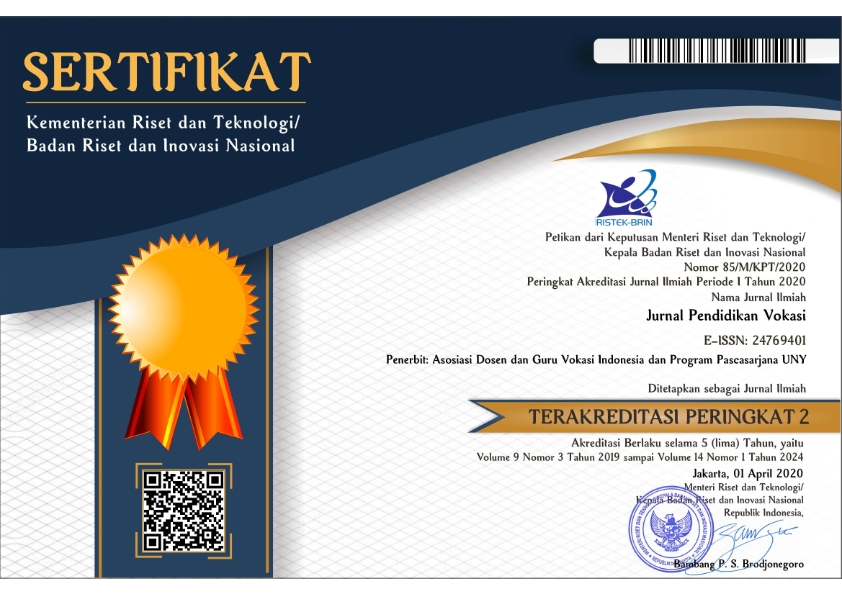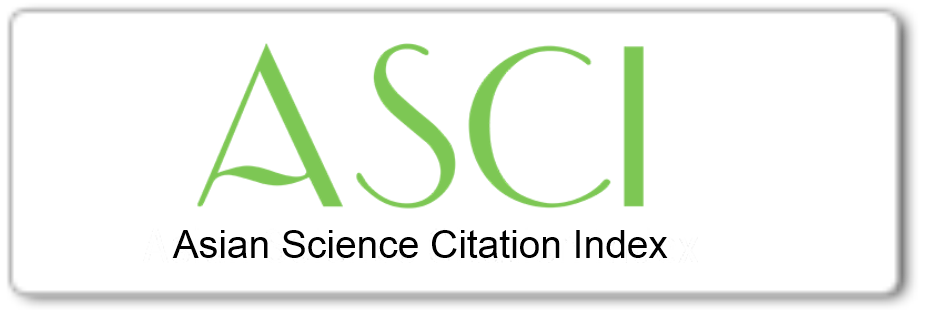The relationship between self-control and academic achievement: A meta-analysis investigation
Heri Retnawati, Universitas Negeri Yogyakarta, Indonesia
Fitri Nur Mahmudah, Universitas Ahmad Dahlan, Indonesia
Galeh Nur Indiatno Putra Pratama, Technische Universität Dresden, Germany
Abstract
Keywords
Full Text:
PDFReferences
Bertrams, A., & Dickhäuser, O. (2009). High-school students’ need for cognition, self-control capacity, and school achievement: Testing a mediation hypothesis. Learning and Individual Differences, 19(1), 135–138. https://doi.org/10.1016/j.lindif.2008.06.005
Borenstein, M., Hedges, L. V., Higgins, J. P. T., & Rothstein, H. R. (2021). Introduction to meta-analysis. John Wiley & Sons.
Card, N. A. (2012). Applied meta-analysis for social science research. Guilford Press.
Cohen, J. (2013). Statistical power analysis for the behavioral sciences. Routledge. https://doi.org/10.4324/9780203771587
Cooper, H. (2015). Research synthesis and meta-analysis: A step-by-step approach. SAGE Publications.
Cooper, H., Hedges, L. V., & Valentine, J. C. (2019). The handbook of research synthesis and meta-analysis. Russell Sage Foundation.
Duckworth, A. L., Quinn, P. D., & Tsukayama, E. (2012). What no child left behind leaves behind: The roles of IQ and self-control in predicting standardized achievement test scores and report card grades. Journal of Educational Psychology, 104(2), 439–451. https://doi.org/10.1037/a0026280
Duckworth, A. L., Shulman, E. P., Mastronarde, A. J., Patrick, S. D., Zhang, J., & Druckman, J. (2015). Will not want: Self-control rather than motivation explains the female advantage in report card grades. Learning and Individual Differences, 39, 13–23. https://doi.org/10.1016/j.lindif.2015.02.006
Duri, R. (2021). Perbedaan kontrol diri (self control) siswa ditinjau dari perlakuan orang tua (otoriter). At-Taujih : Bimbingan Dan Konseling Islam, 4(2), 70–80. https://doi.org/10.22373/taujih.v4i2.11758
Egger, M., Smith, G. D., Schneider, M., & Minder, C. (1997). Bias in meta-analysis detected by a simple, graphical test. BMJ, 315(7109), 629–634. https://doi.org/10.1136/bmj.315.7109.629
Elias, N., Awang, A., & Mohamed, M. N. (2005). Examining religiosity and its relationship to self-control, procrastination and academic achievement. Malaysian Journal of Learning & Instruction, 2, 1–16. https://repo.uum.edu.my/id/eprint/210/
Elnina, D. R. (2022). Kemampuan self control ditinjau dari perilaku impulsive buying terhadap produk fashion pada mahasiswa. Psikodinamika - Jurnal Literasi Psikologi, 2(1), 1–19. https://doi.org/10.36636/psikodinamika.v2i1.955
Haghi, A. H., Kharrat, R., Asef, M. R., & Rezazadegan, H. (2013). Present-day stress of the central Persian Gulf: Implications for drilling and well performance. Tectonophysics, 608, 1429–1441. https://doi.org/10.1016/j.tecto.2013.06.001
Honken, N., Ralston, P. A., & Tretter, T. R. (2016). Self-control and academic performance in engineering. American Journal of Engineering Education (AJEE), 7(2), 47–58. https://doi.org/10.19030/ajee.v7i2.9831
Intani, C. P., & Ifdil, I. (2018). Hubungan kontrol diri dengan prestasi belajar siswa. Jurnal EDUCATIO: Jurnal Pendidikan Indonesia, 4(2), 65–70. https://doi.org/10.29210/120182191
Judistira, A. A., & Wijaya, H. E. (2017). The role of self-control and self-adjustment on academic achievement among junior high school students. Proceedings of the 3rd International Conference on Education and Training (ICET 2017), 122–125. https://doi.org/10.2991/icet-17.2017.19
Khan, G. F., Sarstedt, M., Shiau, W.-L., Hair, J. F., Ringle, C. M., & Fritze, M. P. (2019). Methodological research on partial least squares structural equation modeling (PLS-SEM). Internet Research, 29(3), 407–429. https://doi.org/10.1108/IntR-12-2017-0509
Kiriakou, J., Pandis, N., Madianos, P., & Polychronopoulou, A. (2014). Developing evidence-based dentistry skills: How to interpret randomized clinical trials and systematic reviews. Progress in Orthodontics, 15(1), 58. https://doi.org/10.1186/s40510-014-0058-5
Kuhnle, C., Hofer, M., & Kilian, B. (2011). The relationship of self-control, procrastination, motivational interference and regret with school grades and life balance. Journal of Childhood and Adolescence Research, 6(1), 31–44. https://elibrary.utb.de/doi/epdf/10.3224/diskurs.v6i1.05
Kuhnle, C., Hofer, M., & Kilian, B. (2012). Self‐control as predictor of school grades, life balance, and flow in adolescents. British Journal of Educational Psychology, 82(4), 533–548. https://doi.org/10.1111/j.2044-8279.2011.02042.x
Li, C., Song, Y., Wang, Q., & Zhang, B. (2022). How does self-control affect academic achievement of adolescents? The dual perspectives of teacher-student relationship and mastery approach goals. Youth & Society, 54(8), 1402–1418. https://doi.org/10.1177/0044118X211030949
Littell, J. H., Corcoran, J., & Pillai, V. (2008). Systematic reviews and meta-analysis. Oxford University Press.
Ma, S., & Li, Y. (2023). The impact between self-control on academic performance among Chinese adolescents. Journal of Education, Humanities and Social Sciences, 8, 1497–1501. https://doi.org/10.54097/ehss.v8i.4510
Marsela, R. D., & Supriatna, M. (2019). Konsep diri : Definisi dan faktor. Journal of Innovative Counseling : Theory, Practice, and Research, 3(2), 65–69. https://journal.umtas.ac.id/index.php/innovative_counseling/article/view/567
Michaelides, M. P., & Durkee, P. (2021). Self-regulation versus self-discipline in predicting achievement: A replication study with secondary data. Frontiers in Education, 6, 724711. https://doi.org/10.3389/feduc.2021.724711
Muammar, O. M. (2015). Intelligence and self-control predict academic performance of gifted and non-gifted students. Turkish Journal of Giftedness and Education, 5(1), 67–81. https://www.researchgate.net/profile/Omar-Almoammar/publication/280621969_Intelligence_and_Self-Control_Predict_Academic_Performance_of_Gifted_and_Non-gifted_Students/links/55bf503908ae092e966539d6/Intelligence-and-Self-Control-Predict-Academic-Performance-of-Gifted-and-Non-gifted-Students.pdf
Ningsih, R. (2018). Pengaruh kontrol diri terhadap perilaku disiplin remaja. Jurnal Psikoedukasi Dan Konseling, 2(2), 48–52. https://doi.org/10.20961/jpk.v2i2.15820
Nota, L., Soresi, S., & Zimmerman, B. J. (2004). Self-regulation and academic achievement and resilience: A longitudinal study. International Journal of Educational Research, 41(3), 198–215. https://doi.org/10.1016/j.ijer.2005.07.001
Pardede, S. C., & Hartono, D. (2022). Kontribusi bermain game online dan self control pada prestasi belajar remaja komunitas royal e-sport Jakarta Timur. Research and Development Journal of Education, 8(2), 777–782. https://doi.org/10.30998/rdje.v8i2.14170
Retnawati, H., Apino, E., Kartianom, K., Djidu, H., & Anazifa, R. D. (2018). Pengantar analisis meta. Parama Publishing.
Rosenthal, R. (1979). The file drawer problem and tolerance for null results. Psychological Bulletin, 86(3), 638–641. https://doi.org/10.1037/0033-2909.86.3.638
Stadler, M., Aust, M., Becker, N., Niepel, C., & Greiff, S. (2016). Choosing between what you want now and what you want most: Self-control explains academic achievement beyond cognitive ability. Personality and Individual Differences, 94, 168–172. https://doi.org/10.1016/j.paid.2016.01.029
Whelan, E., Golden, W., & Tarafdar, M. (2022). How technostress and self-control of social networking sites affect academic achievement and wellbeing. Internet Research, 32(7), 280–306. https://doi.org/10.1108/INTR-06-2021-0394
Wu, H.-Y., Kung, F. Y. H., Chen, H.-C., & Kim, Y.-H. (2017). Academic success of “Tiger Cubs.” Social Psychological and Personality Science, 8(6), 698–705. https://doi.org/10.1177/1948550616675667
DOI: https://doi.org/10.21831/jpv.v14i2.62649
Refbacks
- There are currently no refbacks.

This work is licensed under a Creative Commons Attribution-ShareAlike 4.0 International License.
Our journal indexed by:
















